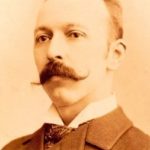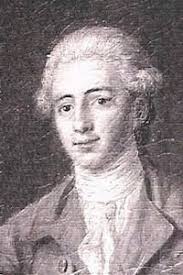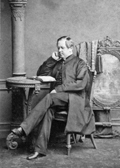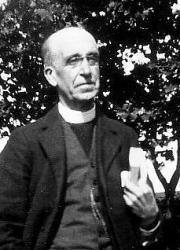Icon by Solrunn Nes
Mount Calvary Church
A Roman Catholic Parish of
The Personal Ordinariate of the Chair of St. Peter
Rev. Albert Scharbach, Pastor
Anglican Use
Christ the King
Common
Missa de S. Maria Magdalena, Willan
Prelude
Introduction-Choral from Suite Gothique, Léon Boëllmann (1862-1897)
Hymns
Al hail the power of Jesus’ name
The King of love my shepherd is
The King shall come when morning dawns
Anthems
Postula a me, Erik Spangler
Sedebit Dominus Rex, Eric Spangler
Postlude
Grand jeu, from Suite du premier ton, Pierre DuMage (1674-1751)
_____________________________________________
Prelude
Introduction-Choral from Suite Gothique, Léon Boëllmann
Her it is on a German organ; and with Marie-Claire Alain on the organ of Saint-Sulpice.
Léon Boëllmann (1862-1897) was a French composer of Alsatian origin, known for a small number of compositions for organ. His best-known composition is Suite gothique (1895), which is a staple of the organ repertoire, especially its concluding Toccata.
During the sixteen years of his professional life, Boëllmann composed about 160 pieces in all genres. Faithful to the style of Franck and an admirer of Saint-Saëns, Boëllmann yet exhibits a turn-of-the-century Post-romantic esthetic, which especially in his organ works, demonstrates “remarkable sonorities.” His best-known composition is Suite gothique (1895), now a staple of the organ repertoire, especially its concluding Toccata, a piece “of moderate difficulty but brilliant effect,” with a dramatic minor theme and a rhythmic emphasis that made it popular even in Boëllmann’s own day.
Boëllmann was born in Ensisheim, Haut-Rhin, the son of a pharmacist. In 1871, at the age of nine, he entered the École de Musique Classique et Religieuse (L’École Niedermeyer) in Paris, where he studied with its director, Gustave Lefèvre, and with Eugène Gigout. Boëllmann there won first prizes in piano, organ, counterpoint, fugue, plainsong, and composition. After his graduation in 1881, Boëllmann was hired as “‘organiste de choeur'” at the Church of St. Vincent de Paul in the 10th arrondissement of Paris, and six years later he became cantor and “organiste titulaire,” a position he held until his early death, probably from tuberculosis.
In 1885, Boëllmann married Louise, the daughter of Gustave Lefèvre and the niece of Eugène Gigout, into whose house the couple moved. (Having no children of his own, Gigout adopted Boëllmann.) Boëllmann then taught in Gigout’s school of organ playing and improvisation.
As a favored student of Gigout, Boëllmann moved in the best circles of the French musical world and as a pleasing personality, he made friends of many artists and was able to give concerts both in Paris and the provinces.[3] Boëllmann became known as “a dedicated teacher, trenchant critic, gifted composer and successful performer…who coaxed pleasing sounds out of recalcitrant instruments.” Boëllmann also wrote musical criticism for L’art musical under the pseudonym “le Révérend Père Léon” and “un Garçon de la salle Pleyel.”
Boëllmann died in 1897, aged only 35. After the death of his wife the following year, Gigout reared their three orphans, one of whom, Marie-Louise Boëllmann-Gigout (1891–1977), became a noted organ teacher in her own right.
_______________________
Hymns
All hail the power of Jesus’ name has a complicated history and several versions. Our version was written mostly by Edward Perronet (1726–1792), as associate of John Wesley. The hymn alludes to the Apocalypse. In Rev 19.16 Jesus is “King of Kings and Lord of Lords” on whose head “are many diadems” (Rev 19.12). The martyrs call from the altar, “I saw under the altar the souls of those who had been slain for the word of God and for the witness (martus) they had borne (Rev 6.9). We sinners, who have tasted the “wormwood and the gall” (Lam 3.19) of our evil deeds, offer our repentance as a trophy to the Lord of all. John sees every kindred, every tribe, “a great multitude…from every nation (Rev 7.9) who cry out “Salvation belongs to our God who sits upon the throne, and to the Lamb.” As we sing we join them in this confession, entering even now into the hymn of praise that will resound forever.
Here is the 1940 Hymnal version:
All hail the pow’r of Jesus’ name!
Let angels prostrate fall;
Bring forth the royal diadem
And crown Him Lord of all.
Bring forth the royal diadem
And crown Him Lord of all.Crown Him, ye martyrs of our God
Who from His altar call;
Extol the Stem of Jesse’s rod
And crown Him Lord of all.
Extol the Stem of Jesse’s rod
And crown Him Lord of all.Hail Him, the Heir of David’s line,
Whom David Lord did call,
The God incarnate, Man divine,
And crown Him Lord of all.
The God incarnate, Man divine,
And crown Him Lord of all.Ye seed of Israel’s chosen race,
Ye ransomed from the Fall,
Hail Him who saves you by His grace
And crown Him Lord of all.
Hail Him who saves you by His grace
And crown Him Lord of all.Sinners, whose love can ne’er forget
The wormwood and the gall,
Go, spread your trophies at His feet
And crown Him Lord of all.
Go, spread your trophies at His feet
And crown Him Lord of all.Let every kindred, every tribe,
On this terrestrial ball
To Him all majesty ascribe
And crown Him Lord of all.
To Him all majesty ascribe
And crown Him Lord of all.
Here is Samuel Metzger’s arrangement.
Here is the 1799 version:
1 All hail the pow’r of Jesus’ name!
Let Angels prostrate fall:
Bring forth the royal diadem,
To crown Him Lord of All.2 Let high-born Seraphs tune the lyre,
And, as they tune it, fall
Before his face who tunes their choir,
And crown Him Lord of All.3 Crown Him, ye morning stars of light,
He fix’d this floating ball;
Now hail the strength of Israel’s might,
And crown Him Lord of All4 Crown Him, ye martyrs of your God,
Who from His altar call,
Extol the stem of Jesse’s rod,
And crown Him Lord of All.5 Ye seed of Israel’s chosen race,
Ye ransom’d of the fall,
Hail Him who saves you by his grace,
And crown Him Lord of All.6 Hail Him, ye heirs of David’s line,
Whom David Lord did call;
The God incarnate, Man divine,
And crown Him Lord of All.7 Sinners! whose love can ne’er forget,
The wormwood and the gall,
Go–spread your trophies at his feet,
And crown Him Lord of All.8 Let every tribe, and every tongue,
That hear the Saviour’s call
Now shout in universal song,
And crown Him Lord of All.
There is an alternative final stanza, found in many hymnals:
O that with yonder sacred throng
We at his feet may fall!
We’ll join the everlasting song,
And crown him Lord of all.
The eliminated stanza with “high-born Seraphs” is charming but odd. “Hail Him, ye heirs of David’s line,” a vocative, addressed presumably to the Jews, was changed to “Hail Him, the Heir of David’s line,” changing heirs to Heir, and putting it in apposition to Him, that is, Christ.
Edward Perronet (1726-1792). The Perronets of England, grandfather, father, and son, were French Huguenot emigres. David Perronet came to England about 1680. He was son of the refugee Pasteur Perronet, who had chosen Switzerland as his adopted country, where he ministered to a Protestant congregation at Chateau D’Oex. His son, Vincent Perronet, M.A., was a graduate of Queen’s College, Oxford. He became, in 1728, Vicar of Shoreham, Kent. He was close to with the Evangelical Revival under the Wesleys and Whitefield.
His son Edward was born in 1726. Born, baptized, and brought up in the Church of England, he had originally no other thought than to be one of her clergy. But, though strongly evangelical, he had a keen and searching eye for defects. A characteristic note to The Mitre, in referring to a book called The Dissenting Gentleman’s answer to the Rev. Mr. White, thus runs:—”I was born, and am like to die, in the tottering communion of the Church of England; but I despise her nonsense; and thank God that I have once read a book that no fool can answer, and that no honest man will.” This strangely overlooked satire is priceless as a reflection of contemporary ecclesiastical opinion and sentiment. It is pungent, salted with wit, gleams with humor, hits off vividly the well-known celebrities in Church and State, and is well wrought in picked and packed words. But it is a curious production to have come from a “true son” of the Church of England. It roused John Wesley’s hottest anger. He demanded its instant suppression; and it was suppressed; and yet it was at this period the author threw himself into the Wesleys’ great work. But evidences abound in the letters and journals of John Wesley that he was intermittently rebellious and vehement to even his revered leader’s authority. Earlier, Edward Perronet dared all obloquy as a Methodist. In 1749 Wesley enters in his diary:
“From Rochdale went to Bolton, and soon found that the Rochdale lions were lambs in comparison with those of Bolton. Edward Perronet was thrown down and rolled in mud and mire. Stones were hurled and windows broken.”
In 1755 arrangements to meet the emergency created by its own success had to be made for Methodism. As one result, both Edward and Charles Perronet broke loose from John Wesley’s law that none of his preachers or “helpers” were to dispense the Sacraments, but were still with their flocks to attend the parish churches. Edward Perronet asserted his right to administer the Sacraments as a divinely-called preacher. At that time he was resident at Canterbury, “in a part of the archbishop’s old palace.” He became one of the Countess of Huntingdon’s “ministers” in a chapel in Watling Street, Canterbury. Throughout he was passionate, impulsive, strong-willed; but always lived near his divine Master. In the close of his life he was an Independent or Congregational pastor of a small church in Canterbury. He died Jan. 2, 1792, and was buried in the cloisters of the great cathedral.
_____________________________
Henry Williams Baker (1821-1877) recast George Herbert’s metrical paraphrase of Psalm 23 into this hymn, The King of love my shepherd is. The true Shepherd -King is Jesus, who cares for His flock by His redemptive death which flows to us through the sacraments. “The streams of living water” flow from Jesus’ pierced side. He ransoms our soul from the captivity of sin, and feeds us with food celestial, “the bread which cometh down from heaven, that a man may eat thereof, and not die.” On our own we never keep to the righteous paths. That is why Jesus comes in love to us, sinners as we are. In his persistent and tender mercy Jesus seeks us, when, “perverse and foolish,” we stray from Him. The wood of the shepherd’s staff is the wood of the cross that guides the strayed soul. Delights flow from Jesus’ pure chalice. The “wine that gladdens the heart” is the Eucharist, the blood of Christ; His is the chalice that overbrims with love. In the Old Testament, our ancestors in faith longed to dwell in the “house of the Lord,” before the revelation of eternal life was clear. But now Christ fulfills that mysterious longing. Jesus is the King who came not be to served but to serve, the one who “giveth his life for the sheep,” the ultimate gift, eternal life with Him.
Here is a Reformed analysis of the hymn:
“We note immediately that the usual way of naming God (“the Lord”) has been replaced with a nonbiblical yet immediately comprehensible allegorical title, “the King of Love.” This unfamiliar opening and the inversion in the first line (“my shepherd is”) prepare the singer for a text that is intentionally—even self-consciously—allusive and aesthetic. This perception of the text is reinforced by the archaic verb forms (“leadeth,” “feedeth”) and the Latinate diction (“verdant,” “celestial”) in the second stanza. The third stanza intensifies the Christological overtones of this paraphrase with allusions not only to the Good Shepherd passage noted earlier but also to Jesus’ parable of the Lost Sheep (Luke 15:4-7; cf. Matthew 18:12-14). The fourth stanza follows the biblical shift from third person to second person, but adds to the images of the shepherd’s rod and staff the suggestion of a processional cross familiar to many nineteen-century Anglican congregations. There is a similar churchy slant in the fifth stanza, where the psalter’s “oil” takes on sacramental tones by being called “unction,” and the usual English translation “cup” becomes a comparably Latinate and ecclesiastical “chalice.” As a result, the reference to God’s “house” in the final line of the sixth stanza does not suggest the Temple in Jerusalem so much as it does the church building in which the hymn is being sung.” (ReformedWorship.org)
I doubt that in the last line “Thy house” is simply the church building; heaven is clearly meant and specified by the “forever.” Anglocatholic services are long, but not that long.
1 The King of love my shepherd is,
whose goodness faileth never.
I nothing lack if I am his,
and he is mine forever.2 Where streams of living water flow,
my ransomed soul he leadeth;
and where the verdant pastures grow,
with food celestial feedeth.3 Perverse and foolish, oft I strayed,
but yet in love he sought me;
and on his shoulder gently laid,
and home, rejoicing, brought me.4 In death’s dark vale I fear no ill,
with thee, dear Lord, beside me;
thy rod and staff my comfort still,
thy cross before to guide me.5 Thou spreadst a table in my sight;
thy unction grace bestoweth;
and oh, what transport of delight
from thy pure chalice floweth!6 And so through all the length of days,
thy goodness faileth never;
Good Shepherd, may I sing thy praise
within thy house forever.
Here is the Cardiff Festival Choir singing the hymn. Here is John Rutter’s lovely arrangement with harp accompaniment.
Henry Williams Baker
Sir Henry Williams Baker was the eldest son of Admiral Sir Henry Loraine Baker. Henry was born in London, May 27, 1821, and educated at Trinity College, Cambridge, where he graduated, B.A. 1844, M.A. 1847. Taking Holy Orders in 1844, he became, in 1851, Vicar of Monkland, Herefordshire. This benefice he held to his death, on Monday, Feb. 12, 1877. He succeeded to the Baronetcy in 1851. His hymns, including metrical litanies and translations, number in the revised edition of Hymns Ancient & Modern, 33 in all.. The last audible words which lingered on his dying lips were the third stanza of his rendering of the 23rd Psalm, “The King of Love, my Shepherd is:”—
Perverse and foolish, oft I strayed,
but yet in love he sought me;
and on his shoulder gently laid,
and home, rejoicing, brought me.
This tender sadness, brightened by a soft calm peace, was an epitome of his poetical life.
The tune is ST COLUMBA. Because the compilers of the 1906 English Hymnal were denied permission to use Dykes’s original tune, musical editor Ralph Vaughan Williams (1872-1958) turned to a folk tune that his former teacher Charles Villiers Stanford (1852-1924) had recently edited for a collection of Irish music (A Complete Collection of Irish Music as noted by George Petri (London, 1902-1905); ST. COLUMBA is no. 1043). The two most notable improvements Vaughan Williams made in the hymn tune known as ST. COLUMBA were the lengthening of the second and fourth lines to extend the Common Meter tune to 8787 in order to accommodate Baker’s text—this being their first appearance together—and the use of a triplet (rather than an eighth and two sixteenths) in the sixth measure. (ReformedWorship.org).
The words of this hymn are often subjected to “modernization,” a process that frequently obscures the meaning the poet intended. For example, a 1994 Lutheran hymnal changes
Thou spreadst a table in my sight;
thy unction grace bestoweth;
and oh, what transport of delight
from thy pure chalice floweth!
to
You spread a table in my sight,
A banquet here bestowing;
Your oil of welcome, my delight;
My cup is overflowing!
The clear allusion to the Eucharistic chalice has been almost completely obscured and the deep emotion of “transports of delight” toned down and transferred to oil, which might be a reference to the oil used at baptism, if Lutherans use, it, but it is very obscure.
_____________________________
The King shall come when morning dawns was written by the Presbyterian minister John Brownlie (1857—1925), who translated many Eastern hymns. Infused with the imagery of morning light typical of early Greek hymnody, this hymn looks back to the time when the Light of the world dawned in Bethlehem, to reveal to us our sins and God’s mercy. We now look forward to Christ’s Second Advent, when His Lordship over all creation will be revealed. There will be no night, for sin and sorrow and death will have passed away. We pray for that that last and first Day, “Maranatha” (Rev 22:20), “Come quickly, King of Kings.”
Here are all the stanzas. The 1940 Hymnal uses stanzas 1, 2, 5, 6, and 7.
1 The King shall come when morning dawns,
And light triumphant breaks;
When beauty gilds the eastern hills,
And life to beauty breaks.2 Not as of old, a little child
To bear, and fight, and die,
But crowned with glory like the sun,
That lights the morning sky.3 O, brighter than the rising morn,
When He victorious rose,
And left the lonesome place of death,
Despite the rage of foes;–4 O, brighter than that glorious morn,
Shall this fair morning be,
When Christ, our King, in beauty comes,
And we His face shall see.5 The King shall come when morning dawns,
And earth’s dark night is past;–
O, haste the rising of that morn,
That day that aye shall last.6 And let the endless bliss begin,
By weary saints foretold,
When right shall triumph over wrong,
And truth shall be extolled.7 The King shall come when morning dawns,
And light and beauty brings;–
Hail! Christ the Lord; Thy people pray,
“Come quickly, King of kings.”
Here is a German group, Corona Vocalis.
Rev. John Brownlie D.D. (3 August 1857 – 18 November 1925) was a Scottish hymnist best known for his translations of early Greek and Latin hymns into English. He was born in Glasgow, Scotland. He received his higher education at the University of Glasgow and the Free Church College. He was licensed by the Presbytery of Glasgow in 1884. In 1885 became assistant minister of Trinity Free Church in Portpatrick, Wigtonshire, Scotland and succeeded the senior pastor there upon his death in 1890. He became a governor of Stranraer High School in 1897, and chairman of the governors in 1901. Glasgow University awarded him an honorary D.D. degree in 1908 for his work in hymnology. He died in Crieff, Perthshire, Scotland and was buried in Portpatrick.
________________________________
Anthems
Postula a me, Eric Spangler
Postula a me, et dabo tibi gentes hereditatem tuam,
et possessionem tuam terminos terrae.
Ask of me and I will give thee the nations for thine inheritance,
and the ends of the earth for thy possession.
________________
Sedebit Dominus Rex, Erik Spangler
Sedebit Dominus Rex in aeternum. Dominus virtutem populo suo dabit.
Dominus benedicet populo suo in pace.
The Lord shall sit King for ever. The Lord will give strength to his people.
The Lord will bless his people with peace.
___________________________
Postlude
Grand jeu, from Suite du premier ton, Pierre DuMage
Here is Lionel Rogg.
Pierre Dumage (du Mage) (1674 – 1751) was a French Baroque organist and composer. His first music teacher was most likely his father, organist of the Beauvais Cathedral. At some point during his youth Dumage moved to Paris and studied under Louis Marchand. He also befriended Nicolas Lebègue, who in 1703 procured for Dumage a position of organist of the Saint-Quentin collegiate church. In 1710 Dumage was appointed titular organist of the Laon Cathedral. Due to strained relations with his superiors in the cathedral chapter, Dumage left on 30 March 1719, at the age of 45, and became a civil servant.[2] He apparently neither played nor composed music professionally until his death.
Dumage’s only surviving work is Premier livre d’orgue, published in 1708. This collection is dedicated to the chapter of Saint Quentin. It contains a single Suite du premier ton: eight pieces in the traditional French forms: Plein jeu, Fugue, Trio, Tierce en taille, Basse de Trompette, Récit, Duo and Grand jeu. In the brief preface Dumage explains that these are his first works, and that he modelled them after the music of his former teacher Marchand. Dumage’s music is, however, of very high quality, and entirely representative of French organ music of the period. Musicologists Félix Raugel and Willi Apel both singled out Dumage’s Récit for its “delicate and gentle lyricism”, and Apel also praised the Tierce en taille and the Grand jeu as particularly striking. Dumage’s second livre d’orgue was presented in 1712 to the chapter of Laon Cathedral, but has never been found.



